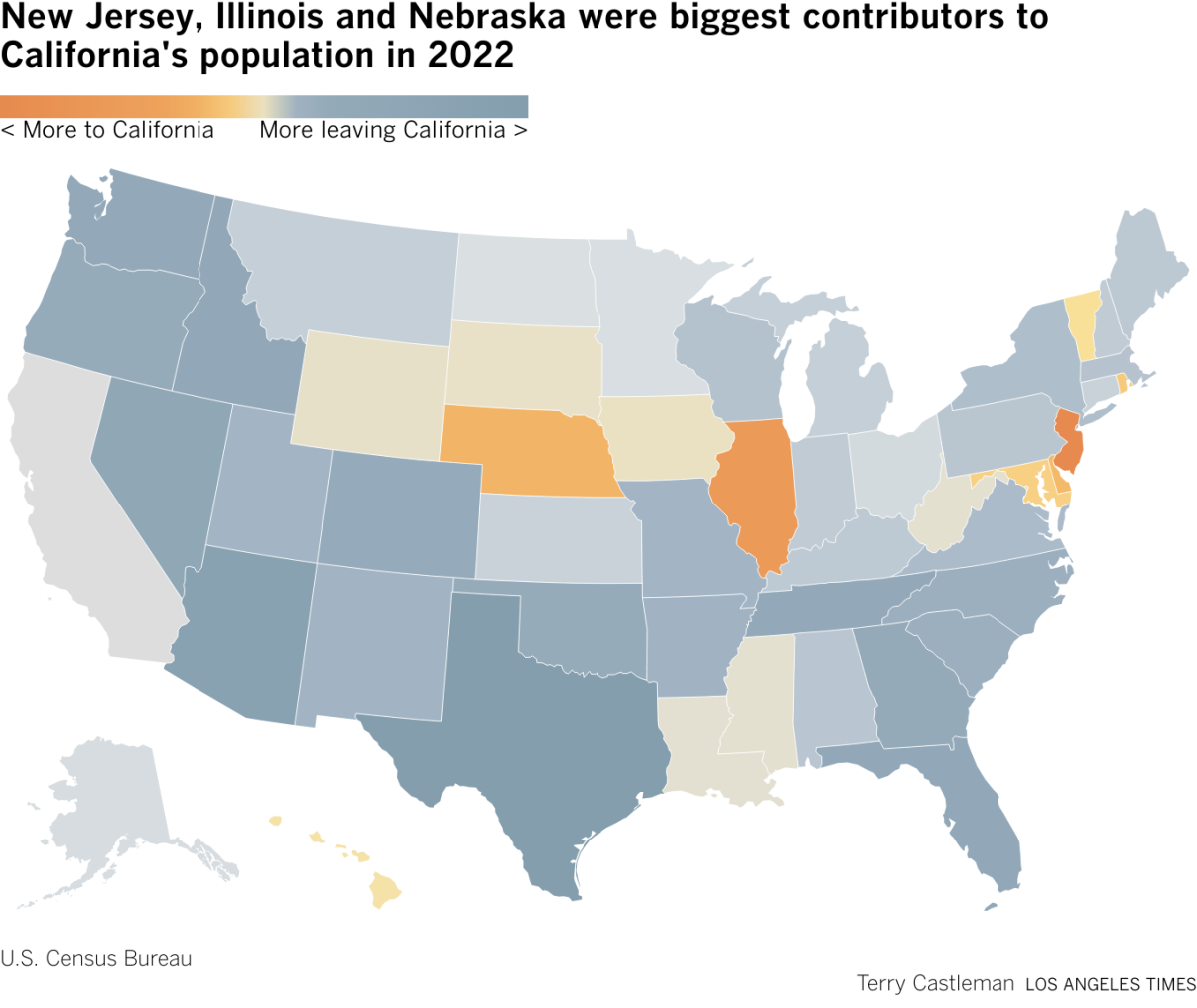Moving From Los Angeles To New Jersey
Making the move from Los Angeles to New Jersey can be a daunting task, especially for those who have grown accustomed to the laid-back West Coast lifestyle. The thought of trading in sunny skies and beaches for crowded streets and humid summers can be overwhelming. However, with its rich history, stunning natural beauty, and unparalleled access to major cities, the Garden State has a lot to offer. Whether you're relocating for work, family, or a fresh start, this guide will provide you with everything you need to know to make a successful transition from LA to NJ.

- Cross-Country Move: What to Expect When Moving from Los Angeles to New Jersey
- How much does it cost to move from LA to NJ?
- Is it a good idea to move to New Jersey?
- Is New Jersey cheaper than Los Angeles?
- Are Californians moving to New Jersey?
- FAQ
- What are the main differences between living in Los Angeles and New Jersey?
- How do I prepare my family for the move from Los Angeles to New Jersey?
- What are the best neighborhoods to live in when moving from Los Angeles to New Jersey?
- How do I handle the logistics of moving from Los Angeles to New Jersey?
Cross-Country Move: What to Expect When Moving from Los Angeles to New Jersey
Moving from Los Angeles to New Jersey can be a daunting task, especially considering the vast distance between the two states. However, with proper planning and preparation, you can make this cross-country move a successful one. Before making the move, it's essential to consider the differences in climate, cost of living, and lifestyle between the two states. Los Angeles is known for its sunny weather, beaches, and relaxed atmosphere, while New Jersey is known for its humid summers, cold winters, and fast-paced East Coast lifestyle. Here are some key things to consider when moving from Los Angeles to New Jersey:
Climate Differences: Be Prepared for a Change
One of the most significant differences you'll encounter when moving from Los Angeles to New Jersey is the climate. Los Angeles is known for its mild Mediterranean climate, with temperatures ranging from 60°F to 80°F (15°C to 27°C) throughout the year. In contrast, New Jersey has a humid subtropical climate, with hot and humid summers and cold winters. Be prepared for a significant change in weather patterns, and pack accordingly.
Cost of Living: How Will Your Expenses Change?
The cost of living in New Jersey is generally higher than in Los Angeles. Housing costs, in particular, are significantly higher in New Jersey, especially in cities like Hoboken and Jersey City. You'll also need to consider the cost of food, transportation, and other living expenses, which may be higher in New Jersey. Make a budget and factor in these increased costs to ensure a smooth transition.
Lifestyle Changes: From Beaches to City Life
Los Angeles is known for its relaxed, laid-back atmosphere, with plenty of beaches and outdoor recreational activities. New Jersey, on the other hand, is situated in the densely populated Northeast corridor, with a more fast-paced lifestyle. You'll need to adjust to a different pace of life, with more traffic, congestion, and a greater emphasis on public transportation.
Job Opportunities: How Will Your Career Be Affected?
Both Los Angeles and New Jersey have strong economies, with plenty of job opportunities in various industries. However, the types of jobs and industries may differ. Los Angeles is known for its entertainment industry, while New Jersey has a strong presence of pharmaceutical, finance, and technology companies. Research the job market in New Jersey and consider how your skills and experience will translate to the East Coast.
Logistics of the Move: Planning and Preparation Are Key
Finally, consider the logistics of the move itself. You'll need to plan and prepare for the long-distance move, including packing, shipping, and storage. Research moving companies, packing supplies, and other resources to make the move as smooth as possible. Here is a table highlighting some of the key differences between Los Angeles and New Jersey:
| Category | Los Angeles | New Jersey |
|---|---|---|
| Climate | Mediterranean, mild | Humid subtropical, hot summers and cold winters |
| Cost of Living | Lower | Higher |
| Lifestyle | Relaxed, outdoor-focused | Fast-paced, urban |
| Job Opportunities | Entertainment, technology | Pharmaceutical, finance, technology |
Key Takeaways: Be prepared for a significant change in climate and lifestyle. Factor in the higher cost of living in New Jersey. Research job opportunities and industries in New Jersey. Plan and prepare for the logistics of the move. Consider the differences in culture and pace of life between the two states.
How much does it cost to move from LA to NJ?
The cost of moving from Los Angeles (LA) to New Jersey (NJ) can vary greatly depending on several factors, including the distance, weight, and type of items being moved, as well as the services required.
Distance and Weight
The distance between LA and NJ is approximately 2,796 miles, which is a significant factor in determining the cost of the move. The weight of the items being moved is also crucial, as it directly affects the fuel consumption and labor required. Here are some estimated costs based on the weight of the items:
- For a small move (less than 2,000 pounds), the cost can range from $2,000 to $4,000.
- For a medium-sized move (2,000-4,000 pounds), the cost can range from $4,000 to $7,000.
- For a large move (more than 4,000 pounds), the cost can range from $7,000 to $12,000 or more.
Moving Services
The type of moving services required can also impact the overall cost. Here are some estimated costs for different services:
- Full-service moving (packing, loading, transporting, and unloading): $5,000 to $15,000 or more, depending on the weight and distance.
- Partial moving services (loading and transporting only): $2,000 to $6,000 or more, depending on the weight and distance.
- Portable storage container moving: $2,500 to $6,000 or more, depending on the container size and distance.
Additional Costs
There may be additional costs associated with moving from LA to NJ, including:
- Fuel surcharges: These can range from 10% to 20% of the total moving cost, depending on the distance and fuel prices.
- Packing materials: These can cost around $100 to $500, depending on the amount and type of materials needed.
- Insurance: This can cost around 1% to 5% of the total moving cost, depending on the value of the items being moved.
Is it a good idea to move to New Jersey?

Moving to New Jersey can be a great idea for some people, but it ultimately depends on individual circumstances and priorities. New Jersey offers a unique blend of urban, suburban, and rural living options, with proximity to major cities like New York and Philadelphia. Here are some factors to consider:
Pros of Moving to New Jersey
New Jersey has a lot to offer, including:
- High standard of living: New Jersey has a high median household income and a strong economy, with many job opportunities in industries like finance, healthcare, and technology.
- Excellent education system: New Jersey is home to many top-ranked public and private schools, as well as prestigious universities like Princeton and Rutgers.
- Rich cultural heritage: New Jersey has a rich history, with many museums, historical sites, and cultural events celebrating its diverse heritage.
Cons of Moving to New Jersey
However, there are also some potential downsides to consider:
- High cost of living: New Jersey has some of the highest property taxes and living expenses in the country, which can be challenging for those on a budget.
- Traffic and congestion: New Jersey is a densely populated state with heavy traffic and congestion, especially in the northern areas near New York City.
- Weather extremes: New Jersey experiences hot and humid summers, as well as cold and snowy winters, which may not appeal to everyone.
Who Might Thrive in New Jersey
New Jersey may be an excellent fit for:
- Professionals and families: Those with a strong career trajectory and families who value excellent schools and a high standard of living may find New Jersey an attractive option.
- Beach lovers and outdoors enthusiasts: With its long coastline and many parks and natural areas, New Jersey offers plenty of opportunities for outdoor recreation and relaxation.
- Foodies and culture enthusiasts: New Jersey's diverse culinary scene and rich cultural heritage make it an exciting place for those who appreciate good food and the arts.
Is New Jersey cheaper than Los Angeles?
The cost of living in New Jersey versus Los Angeles is a significant consideration for anyone thinking of relocating. While both states have their advantages and disadvantageswebdriver, the overall cost of living in New Jersey is generally lower than in Los Angeles.
Housing Costs
The cost of housing is one of the most significant factors to consider when deciding which state to live in. In Los Angeles, the median home price is around $849,000, while in New Jersey, it's around $343,000. This significant difference in housing costs can greatly impact the overall cost of living. Here are some examples of housing costs in each state:
- In Los Angeles, the average rent for a one-bedroom apartment is around $2,500 per month.
- In New Jersey, the average rent for a one-bedroom apartment is around $1,500 per month.
- The average mortgage payment in Los Angeles is around $3,500 per month, while in New Jersey, it's around $1,700 per month.
Taxes
Taxes are another significant consideration when evaluating the cost of living in New Jersey versus Los Angeles. New Jersey has some of the highest taxes in the country, with a top marginal income tax rate of 10.75%. California, on the other hand, has a top marginal income tax rate of 13.3%. However, New Jersey's overall tax burden is lower due to lower property taxes. Here are some examples of taxes in each state:
- In New Jersey, the average property tax bill is around $8,500 per year.
- In Los Angeles, the average property tax bill is around $5,500 per year.
- New Jersey's sales tax rate is 6.625%, while California's is 7.25%.
Other Living Expenses
In addition to housing costs and taxes, there are other living expenses to consider when evaluating the cost of living in New Jersey versus Los Angeles. Here are some examples:
- In Los Angeles, the average cost of groceries is around 10% higher than in New Jersey.
- The average cost of transportation in Los Angeles is around 20% higher than in New Jersey due to higher gas prices and parking fees.
- Utility costs, such as electricity and water, are around 15% higher in Los Angeles than in New Jersey.
Are Californians moving to New Jersey?
While it's true that many Californians are leaving the Golden State, New Jersey is not exactly a top destination for them. According to data from the United States Census Bureau, between 2019 and 2020, California lost over 691,000 residents to domestic migration, with the majority moving to states like Texas, Arizona, and Nevada. New Jersey, on the other hand, ranked 24th on the list of states that Californians moved to, with only about 14,000 making the switch.
Why aren't Californians flocking to New Jersey?
There are several reasons why Californians might be skipping over New Jersey. Cost of living is a significant factor, as New Jersey has some of the highest property taxes in the country. Additionally, the state's densely populated areas and high cost of housing might be deterrents for those looking to escape California's high prices. Here are a few more reasons:
- New Jersey's job market is not as strong as some other states, with an unemployment rate higher than the national average.
- The state's weather can be quite different from California's, with cold winters and humid summers.
- New Jersey's traffic is notoriously bad, which might be a turn-off for those who value a more relaxed pace of life.
Where are Californians moving instead?
So, if not New Jersey, where are Californians moving to? Texas is a clear favorite, with over 86,000 Californians making the move between 2019 and 2020. Arizona and Nevada are also popular destinations, with over 59,000 and 47,000 Californians moving to each state, respectively. Here are some reasons why:
- Texas offers a lower cost of living and a thriving job market, making it an attractive option for those looking to relocate.
- Arizona's warm weather and outdoor recreation opportunities are a draw for Californians who want to escape the Golden State's high prices but still enjoy a desert climate.
- Nevada's tax-friendly environment and growing tech industry make it an appealing choice for those looking to start a new business or career.
What does this mean for New Jersey?
While New Jersey might not be a top destination for Californians, the state is still experiencing population growth. However, this growth is largely due to international migration and birth rates, rather than domestic migration. To attract more out-of-state movers, New Jersey might need to address its affordability issues and invest in its infrastructure to make it a more appealing option for those looking to relocate. Here are some potential strategies:
- New Jersey could offer tax incentives to attract businesses and individuals.
- The state could invest in its transportation infrastructure, making it easier for people to get around without a car.
- New Jersey could develop more affordable housing options, making it a more viable choice for those priced out of California.
FAQ
What are the main differences between living in Los Angeles and New Jersey?
When moving from Los Angeles to New Jersey, you'll experience a significant change in lifestyle, culture, and environment. Weather is one of the most notable differences, as LA is known for its sunny and dry climate, while New Jersey has a more humid and seasonal climate with cold winters and hot summers. Additionally, the cost of living in New Jersey is generally lower than in LA, with lower housing costs and taxes. The pace of life is also distinct, as LA is a fast-paced and busy city, while New Jersey is more laid-back and suburban. Finally, the job market in New Jersey is more diverse, with major industries in pharmaceuticals, finance, and tourism, whereas LA is dominated by the entertainment industry.
How do I prepare my family for the move from Los Angeles to New Jersey?
Preparing your family for the move from Los Angeles to New Jersey requires careful planning and communication. First, involve your children in the moving process by explaining the reasons for the move and what they can expect. Next, research schools in your new area and ensure they meet your standards. Also, plan fun activities for your family to explore their new surroundings and make new connections. Additionally, consult with your pediatrician to ensure any necessary medical records and vaccinations are transferred. Finally, stay positive and focus on the exciting opportunities this new chapter will bring.
What are the best neighborhoods to live in when moving from Los Angeles to New Jersey?
When moving from Los Angeles to New Jersey, choosing the right neighborhood is crucial for a smooth transition. Suburban areas like Morristown, Westfield, and Summit offer a more laid-back atmosphere, with easy access to parks, schools, and shopping centers. Urban areas like Jersey City, Hoboken, and Newark provide a more fast-paced lifestyle, with access to public transportation and a diverse range of cultures. Coastal towns like Point Pleasant, Beach Haven, and Cape May offer a beach lifestyle, with plenty of outdoor activities and a strong sense of community. Research each area thoroughly to determine which best fits your lifestyle and budget.
How do I handle the logistics of moving from Los Angeles to New Jersey?
Handling the logistics of moving from Los Angeles to New Jersey requires careful planning and execution. First, hire a reputable moving company that can handle long-distance moves. Next, sort and purge your belongings, donating or selling items you no longer need. Pack strategically, labeling and organizing boxes by room and priority. Transfer your utilities, setting up new accounts with electricity, gas, and water providers. Finally, update your address with the US Postal Service, banks, credit cards, and other relevant institutions to ensure a smooth transition.

